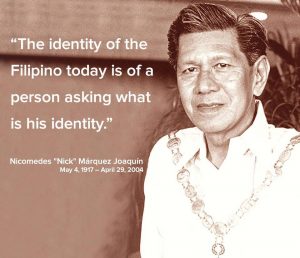By Mary Clarince David – PTV News

“The identity of the Filipino today is of a person asking what is his identity.”
Nicomedes “Nick” Márquez Joaquín
(May 4, 1917 – April 29, 2004)
Identity is the history that has gone into bone and blood and reshaped the flesh. Identity is not what we were but what we have become what we are at this moment.
No individual existence can be traced further than the moment of conception, which determined that what was to be born would be this person and no other.
He was a living keeper of our national memory. A great poet and playwright. The only Filipino writer with a real imagination—an imagination filled of power, depth, and great metaphysical seeing. Nick Joaquin knew how to express himself using great language. Joaquin wrote poetry and revealed behind his writings a genuine first-rate mind.
“Before 1521 we could have been anything and everything not Filipino; after 1565 we can be nothing but Filipino.” Joaquin elaborately expressed the difference between the Spaniards and the Americans; that the technical revolution provoked by the first produced the Filipino, while the cultural upheaval provoked by the second merely helped us to become more aware of this Filipinos.
Joaquin has proven “truism”, which explains that in order to understand the present, you have to first know the past. And by exhibiting the present as a continuation of the future, he has traced the roots of our rotting society and relate it to our moral confusion.
“When we say that the West has brought us nothing but evil, do we mean that beef is evil, that cabbages are evil, that the guisado is evil?” He claims that the Filipino identity, especially its comprising sense of community, emerged not in the 19th century with the Ilustrados, but much earlier, in the 16th and 17th centuries, which is when the people of the archipelago were irreversibly changed by the arrival of Western tools and technologies brought by the Spaniards.
The idea is that it was not the imagination of a few patriots that enabled a sense of solidarity or community or nation, but the more widespread experience of people adjusting to new ways of life, hence, “the point is not how we use a tool, but how it uses us.”
“The person may change from baby to child, and from boy to man, but through all these changes he will remain this person and cannot be another, because all possibilities to the contrary that may have existed before the moment of conception ended forever with the moment of conception.”
He accepted that Philippine culture as such it is and as such it has been. Some of the Filipinos may deplore foreign influences, the fact is that we have been subjected to and have assimilated. Foreign cultures became part of ourselves. There are some among us who would like to exclude all foreign influences and would like to see a “PURE Filipino culture” without any admixture of Spanish or American or Chinese or Indian influence. Desirable as such a culture might be, it does not exist. We are as we are, as we have been shaped by history. Joaquin has already accepted that history brought us change not only in our lives but also on how we faced and live as years passes by and gave splendid expression to it.
“We are not quite conscious of the reason for our disdain when we refer to the illiterate past as wallowing in ignorance… What divides us from them is the column of print. Theirs was a total culture involving all the senses, while ours is a culture concentrated in the literate eye.”
As if to challenge ideas of modern-culture superiority, Joaquin notes how literate culture is subservient to the faculty of vision, how it is often limited to the spaces of museums, theaters, and galleries; he contrasts this with multi-sensory “folk” culture, which is comprised of everyday experience.
As years passes by, culture is a strong part of people’s lives. It influences our views, values, humor, hopes, loyalties, and our worries and fears. “If for us culture means museum and library and open house and art gallery, for them it meant the activities and amenities of everyday life… The rift is… between “folk” culture, where the unschooled can be wise, and print culture, which enslaved the other senses to the eye.”
Joaquin has been among the most highly acclaimed in Philippine literature since the mid-20th century. The diverse cultural heritage of the country not only animates most of Joaquin’s fiction writing, but it is also central to his nonfiction work. Among the most celebrated of Joaquin’s works is his play A Portrait of an Artist as a Filipino (1966).
He was a product of his time; his journalism was both intellectual and provocative by raising the bar of reportage in our country. He was a catalyst for change who touched on the importance of freedom not just of the press but also as artists and teaches us a lesson that, “we are as we are, as we have been shaped by history” as days pass by.
Sources: Quotes from the books and poems of Nick Joaquin
